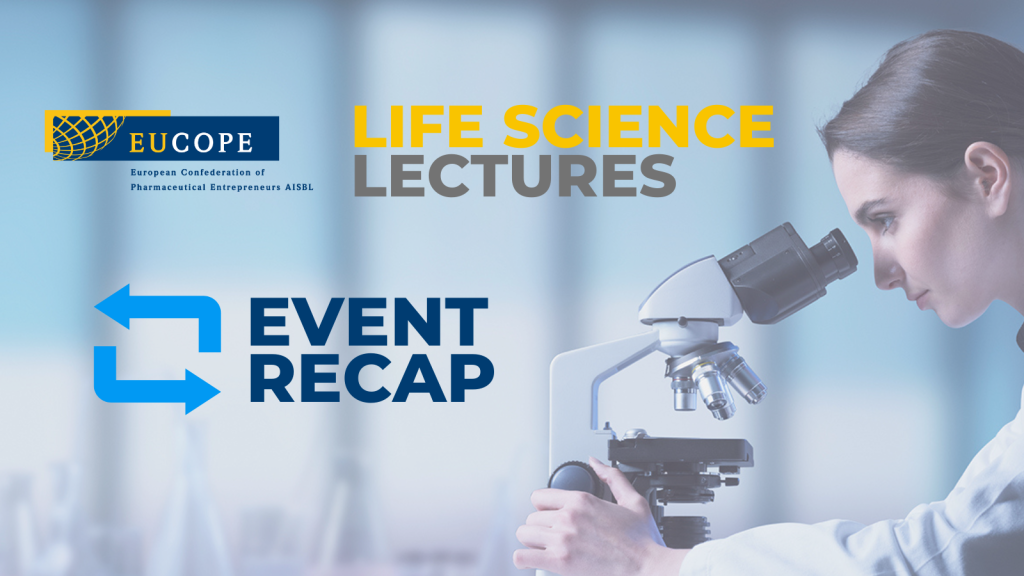EUCOPE Resources / News - June 9, 2023
EVENT RECAP – Life Science Lectures: Episode One “Attaching Conditionalities to Incentives”

On 30 May, EUCOPE – the European Confederation of Pharmaceutical Entrepreneurs hosted the inaugural episode of its Life Science Lectures webinar series, “Attaching conditionalities to incentives: the right path to improve access?”
The episode delved into the incentive system outlined in the EU Pharmaceutical Package, with the aim to shed light on how these provisions could impact innovation and access to medicines in the EU.
The EU Pharmaceutical Package is a once-in-a-generation opportunity to foster innovation and ensure a future-proof, crisis-resistant regulatory ecosystem. The EU Commission’s proposal aims to address availability, affordability, accessibility, and competition by introducing incentives and requirements for medicine product developers. Striking a balance between incentivising biopharmaceutical companies and ensuring patient access to medications is the overarching goal of proposal. During the panel discussion, several views were raised on whether these conditional incentives would stimulate or harm access, innovation, and competitiveness in the EU.
Throughout the discussion, there was a shared recognition to address unmet medical needs and stimulate innovation in areas that have seen limited progress in recent years. According to Anthony Rodiadis, Policy Officer in DG SANTE at the European Commission, the current system fails to address these needs effectively. Looking at the changes proposed by the Commission, Rodiadis highlighted
“Incentives around unmet medical needs will spur research in fields like neurodegenerative illnesses, infectious diseases, and antimicrobial drugs”. He mentioned that the reform follows a pragmatic approach rewarding companies that “go the extra mile to deliver on important public health goals” and foresees all the necessary flexibilities to take into account market realities, including for SMEs and smaller companies.
While Fredrik Erixon, Director at European Centre for International Political Economy (ECIPE), expressed support for the use of incentives in regulatory protection. He also acknowledged the challenges of defining high unmet medical needs and promoting innovation in complex areas. According to Erixon,
“Many of these unmet needs are unmet for a reason, because we are talking about complex areas where investment in scientific research hasn’t been enough. Diseases are so complex that require long time to develop a drug. If we start to make changes to the system that are pretty marginal, I don’t think we should expect that the consequences are going to be very substantial”, suggesting that stronger incentives, longer exclusivity periods, and extended patents will be necessary to drive development in these areas.
Ensuring faster patients access in therapies, especially in undeserved therapeutic area, is the main objective of the Pharmaceutical Package. Alexander Natz, Secretary-General of EUCOPE, acknowledges the need for a modulated approach to support the development of rare disease therapies in areas with no viable treatment options. However, he warns,
“Defining a high unmet medical need (HUMN) is a very individual exercise, and it is based on needs of individual patients. It is challenging to find an appropriate definition that takes all the needs into consideration”.
On this topic, Milan Mishkovikj, Vice President at the Alliance of Patients’ Organisations (APO) in North Macedonia and Director of the European Liver Patient Association (ELPA), replied
“Positive feedback from patients depends on the specific provisions within the proposal and how well they address UMN. It is important to have a well-defined and comprehensive understanding of the medical needs specific to liver diseases”. Mishkoviki also stressed the importance of considering the severity, prevalence and available technical options as well as considering healthcare professionals, patients’ organisations and experts’ inputs.
The evolving healthcare landscape requires the EU to keep pace with the ongoing advancements in scientific research and medical knowledge. The participants emphasised the crucial role of a predictable and future-proof framework within the Pharmaceutical Legislation to drive innovation and maintain the EU competitiveness in the global market. The EU robust Intellectual Property (IP) protection system was acknowledged, and the use of incentives as a tool to deliver on the access objective was highlighted. Streamlining regulatory processes along with existing initiatives such as PRIME and regulatory sandboxes are important steps towards reducing regulatory burden, enhancing support for the development of medicines and fostering innovation.
On this subject, Francis Pang, Senior Vice President, Global Market Access and Market Expansion, at Orchard Therapeutics, highlighted the need for a predictable framework that developers can rely on. He expressed concerns that the Commission’s proposal could undermine this predictability, which is crucial for small companies, the drivers of innovation:
“Launching in all 27 Member States can be financially unviable and impractical for many small and mid-sized enterprises, particularly for technologies such as ATMPs with small or non-existent patient groups in rare diseases or lack of suitable medical specialists in certain countries”. Pang suggested that flexibility and longer allowances should be considered to support small and mid-sized companies, and overcome the challenges associated with launching in all Member States.
EUCOPE believes it is essential that the EU remains globally attractive for investments, to encourage innovation and access. Achieving this goal requires an agile, flexible, and appropriate regulatory framework that is founded on science and is future-proof.
Don’t miss out on the second episode of the Life Science Lectures webinar series on “Defining (high) unmet medical need: will it steer innovation towards filling existing gaps?“, scheduled on 6 July.
Mark your calendars and register now to secure your spot. Stay tuned for updates and be ready for an insightful session filled with valuable knowledge and engaging discussions.

